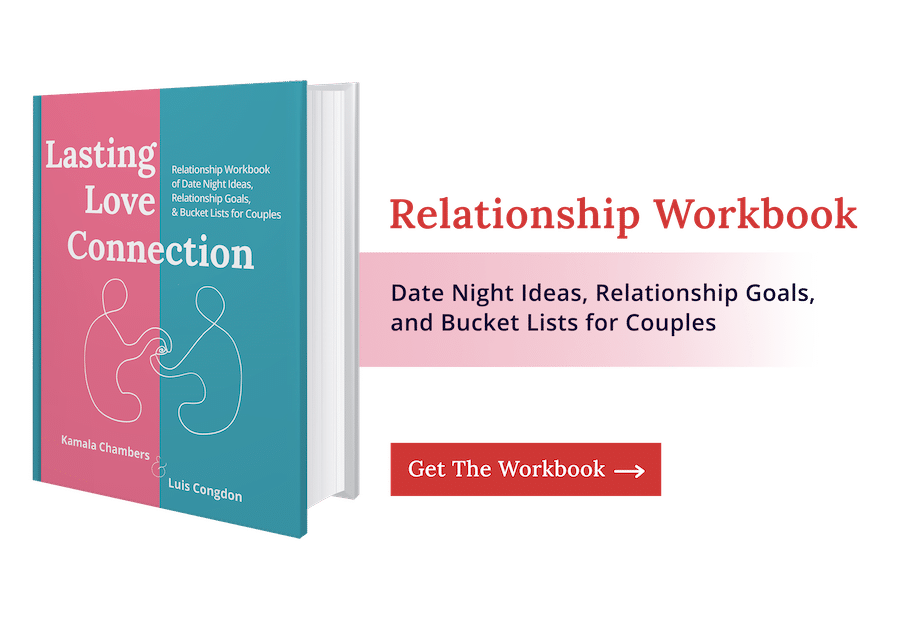Are you or your partner someone who struggles with avoidance of conflict?
If you avoid conflict, you may have noticed your behavior negatively affecting your relationships. However, breaking conflict avoidance patterns is challenging.
On the other hand, if your partner is conflict-avoidant, you might feel confused or frustrated by their actions, especially if you prefer addressing issues directly as they arise.
This article explores where conflict avoidance comes from, how it impacts relationships, and what to do about it.
You’ll get practical strategies for conflict-avoidant people to manage their anxiety around confrontation.
Additionally, we’ll look at how to support conflict-avoidant partners to express themselves.
Table of Contents
What is avoidance of conflict?
Conflict avoidance occurs when you choose not to address issues in your relationship.
Conflict avoidance manifests in various ways
- shutting down during difficult conversations.
- stonewalling (one of the Four Horsemen).
- leaving the room instead of talking things through.
- not expressing your concerns or needs to avoid a disagreement.
Where does avoidance of conflict come from?
To better understand conflict avoidance, let’s explore where this behavior starts and how it is perpetuated.
Avoidance of conflict is rooted in childhood experiences

Conflict avoidance is a learned behavior often shaped by childhood experiences.
Many people who avoid conflicts grew up in families where parents were authoritarian or neglectful.
The parents would make decisions without involving the children in conversations or seeking their input.
Children who tried to share their thoughts and feelings were usually dismissed or shut down.
Consequently, they learned to suppress their true feelings and adopted the belief that avoiding conflict is the only way to stay safe.
These children carry this pattern into their relationships, where they are afraid to share their needs for fear of hurting their partners and causing conflict.
At the first sign of potential conflict, their nervous system becomes activated, leading them to shut down, stonewall, or flee.
Avoidance of conflict stems from unhelpful beliefs

Many conflict-avoiders believe that expressing negative feelings could worsen the situation in their relationship.
Such beliefs are often developed during childhood and reinforced in adult relationships.
For example, they may have had a past relationship where even a minor disagreement would escalate into a screaming match and name-calling.
This experience confirmed their childhood beliefs and reinforced their tendency to suppress their feelings to maintain peace.
How does avoidance of conflict impact relationships?
Conflict avoidance takes a toll on relationships, leading to tension, hurt, and diminished intimacy.
Avoidance of conflict leads to relationship stress

When one person in a relationship avoids conflict while the other prefers to hash things out, it creates significant frustration and stress.
It is common for a conflict-avoider to end up in a relationship with someone with the opposite personality type.
While the conflict-avoider represses their feelings, the other person expresses them.
They want to get everything out on the table so they can say what they need to and move past it.
They are uncomfortable with holding stuff in.
This difference in communication styles often leads to misunderstandings and tension.
It’s common for conflict-avoiders to shut down during difficult conversations, making it seem like they don’t care or are disengaged.
However, this behavior stems from a dysregulated nervous system, which impairs their ability to reason and communicate effectively.
It’s important to remember that both you and your partner, whether shutting down or becoming more expressive, are experiencing similar internal stress.
If you and your partner were hooked to a monitor, both of you would show signs of the fight or flight response, such as increased heart rate and blood pressure.
In such situations, both you and your partner are outside your window of tolerance and unable to have a productive conversation.
Rather than taking your partner’s reaction personally, it’s important to acknowledge that they are experiencing the same anxiety and stress that you are, even if it manifests differently.
Avoidance of conflict leads to unmet needs

Additionally, avoiding conflict results in you or your partner not getting your needs met.
For example, if you do not express what you desire in terms of sexual intimacy due to fear that you will start an argument, your partner won’t know what you need to feel fulfilled sexually.
Or let’s say you are feeling exhausted and overwhelmed with your responsibilities at home. You need your partner’s help sharing the load but are afraid to express your feelings.
By staying quiet about your frustrations, you prevent the chance for positive change.
Instead, you harbor resentment towards your partner, which will continue to build up over time.
Avoidance of conflict is a missed opportunity for intimacy

Avoiding conflict with your partner hinders the growth of your relationship.
Each time you shy away from a disagreement, you miss out on an opportunity to strengthen your connection and build trust.
Conflict is a normal part of any relationship.
Research shows that dealing with conflict constructively improves your relationship in the long run.
While conflict is often seen in a negative light, it doesn’t have to look like a heated argument or power struggle.
Rather than avoiding confrontation, the key to a successful relationship is learning how to address conflict in a healthy way.
Healthy conflict brings you closer
When you view conflict as an opportunity for growth, it leads to a fuller understanding of your partner and deeper intimacy.
Healthy conflict management strategies allow you to discuss your differences calmly and work together to get on the same page.
What can you do if you tend to avoid conflict?

If you struggle with avoiding conflict, don’t be too hard on yourself.
Changing a long-standing pattern is challenging and doesn’t happen overnight.
So, don’t beat yourself up for your tendency to avoid conflict or engage in unhelpful behaviors such as shutting down or fleeing.
Instead, focus on the small steps you can take to bring awareness to your behavior and communicate your anxiety with your partner.
By doing so, you can work on improving your marriage communication skills and gradually become more comfortable with managing conflict.
Here are some steps you can take if you have conflict avoidance.
Notice bodily sensations
First, pay attention to what’s going on in your body during a conflict.
For example, when your partner brings up an issue, you notice your heart starts pounding and your muscles tense up.
These are common signs of the stress response.
Signs of fight, flight, freeze, or fawn
- Increased heart rate
- Rapid breathing
- Muscle tension
- Sweating
- Increased blood pressure
- Upset stomach
- Shaking or trembling
Let your partner know what you’re experiencing

Then, communicate with your partner that you feel anxious or overwhelmed and are starting to shut down.
Bringing awareness to what’s happening disrupts your unconscious patterns and invites your partner into your experience.
Once you have expressed your feelings, you can work together to choose a different approach.
Take a break
When you are emotionally flooded, thinking clearly and problem-solving becomes impossible.
After telling your partner you feel overwhelmed, take a twenty-minute break.
During this time, avoid thinking about the confrontation.
Instead, focus on doing something that helps you calm down.
Self-soothing activities include
- Taking a walk outside.
- Practicing deep breathing or meditation.
- Reading a book.
- Watching a TV show or movie.
- Listening to music.
3 tips for supporting a conflict-avoidant partner
Now, let’s look at how you can support a partner who routinely avoids conflict.
1. Overcome avoidance of conflict with positive reinforcement

If you want to help your partner overcome their conflict avoidance, positive reinforcement is a helpful tool.
Encourage your partner to talk about their thoughts and feelings with you.
When they express themselves, create a safe and non-judgmental space for them to open up.
Show your appreciation for their efforts by saying things like, “Thank you for telling me that,” or “Could you tell me more about what that’s like for you?”
Each positive experience your partner has with opening up challenges their belief that they must remain silent to stay safe.
2. Overcome avoidance of conflict with relationship check-ins

Regular relationship check-ins are essential for keeping your relationship healthy.
This ritual is even more crucial if your partner struggles with anxiety related to conflict.
By dedicating consistent time and space to express your concerns, you can discuss any relationship issues and prevent them from becoming more significant problems.
Moreover, making open communication a regular practice helps your partner learn to talk about their thoughts and feelings more comfortably and realize that it can lead to positive results.
For a step-by-step guide to relationship check-ins, pick up the Relationship Workbook.

3. Overcome avoidance of conflict with healthy conflict management skills
Improving how you handle confrontation may make your partner less afraid of conflict.
Instead of attacking or criticizing your partner, communicate your needs respectfully.
When your partner expresses their point of view, try to understand where they’re coming from and take responsibility for any role you may have played in the issue.
By resolving conflicts calmly and respectfully, you create a safe space for your partner to address their concerns without fear of judgment and stop the cycle of fighting.
Seek expert support to navigate avoidance of conflict

If conflict avoidance is causing challenges in your relationship, seek support instead of trying to handle it on your own.
Conflict avoidance is a deeply ingrained pattern that takes time and effort to unravel.
A marriage counselor assists you in identifying the root of these patterns and learning healthy ways to communicate effectively and stay present with your partner.
By working with a counselor, you’ll have the opportunity to practice discussing your concerns and needs with your partner and learn how to work through the anxiety and discomfort that come with confrontation.
Book a complimentary couples consultation to learn more about marriage counseling and how we can support you in healthy conflict management.
What is it called when someone avoids conflict?
People who tend to avoid conflict are often referred to as having an “avoidant” or “avoidance” style. These individuals typically shy away from direct confrontation. They may go to great lengths to maintain peace and harmony in their relationships, even if it means suppressing their own needs or opinions.
Why some people can’t handle conflict?
There are various reasons why people tend to avoid confrontation, including 1) Extreme fear of rejection, abandonment, or being seen in a negative light by others. 2) Inadequate communication skills. 3) Cultural or familial backgrounds that do not encourage open expression. 4) Previous trauma or negative experiences with confrontation that lead individuals to avoid conflict altogether.
What to do when someone refuses to resolve conflict?

If you’re wondering how to deal with conflict avoidant personality, try these strategies: 1) Focus on staying calm. 2) Ask open-ended questions so you can have a better understanding of their feelings and concerns. 3) Communicate your boundaries clearly, emphasizing the importance of addressing the issue to keep your relationship healthy. 4) If the conflict persists, seek the help of a mental health professional.
How can ignoring a conflict make it worse?
Avoiding conflict can be tempting, but it often means that the root causes of issues are left unaddressed. These unresolved problems fester and escalate over time, leading to even more tension and potentially causing an emotional outburst when the conflict finally surfaces. Moreover, conflict avoidance leads to resentment, communication breakdown, a loss of trust, and a decline in mental health. Address conflicts in their early stages to avoid these significant consequences.






0 Comments